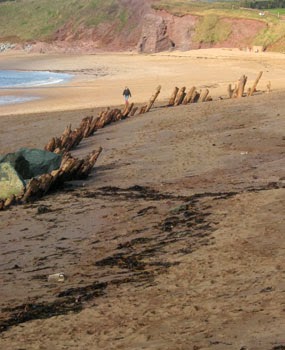One of the theoretical joys of being self-employed is that one's time's one's own. (Actually, working in the arts, this is very rarely the case – everyone I know who, like myself, makes their income from creativity and is not employed by A N Other routinely works far longer hours than most employees, and of course with an erratic and usually scanty income, rather than a regular salary.)
So/but now and then there is an opportunity too good to miss. The deep-sea storms have brought a wealth of kelp to the South Devon beaches, and this past Monday was a beauty – soft sun, after so much rain and hail and cold.
I began work on Monday at about 7.30am, so that mid-morning TM and I could make a trip to South Milton, where I knew the seaweed would be piled up by the southwesterlies at the eastern edge of the beach, and to where we could bring the truck.
South Milton, along with neighbouring Thurlestone, is also an important wetlands site, so we got out of the truck to the sound of many wild geese and oystercatchers, plus other waterbirds. Above us, a sparrowhawk surfed the wind.
I do have to confess that a bit of a pull is the beach café, open 364 days of the year:
where the veggie breakfast was so massive, and the coffee so good, that in gratitude or guilt I agreed we'd fill 26 bags this time, and so we did:
 |
| C21st hunter-gatherer with 4x4 |
Also on the beach was a mermaid's purse, its occupant, a member of the shark family – perhaps skate or ray, I don't know for sure* – long gone.
Sharks, especially the large ones, top of the foodchain and therefore necessary to the health of the whole, like wolves, are an endangered species: from memory, one shark is killed worldwide every three minutes, day and night, whereas human deaths from sharks are a handful a year, and those usually either in self-defence on the part of the shark (fishermen who've dragged them into boats, or harpooned them), or shark mistaking a human for a seal, whereupon they normally spit them out again. It's worth remembering this, given how much we demonise the creatures.
(*If you know, I'd love to know; been going round in circles on the internet.)
There is something so happy-making about the action of gathering free food (well, this will become food for our veg and fruit, which will then become food for us), in such abundance. It's not just the sun, and the sea, and a morning bunking off work; nor is it just the primal foraging instinct. (And it wasn't entirely the veggie-breakfast-bribe.)
There's something else, for me: deeper than all that in combination. I don't know whether it's directly ancestral – all my Celtic forebears will have done this on the Atlantic seaboard back to the early days of farming in the Neolithic; or whether it's simply something about being completely in tune with the land, the turning year, in my body and out of my head, by the sea: in alignment with everything.
As you perhaps know as I speak of it often here, I feel as if I'm doing the work I was born to do, with my own writing, with my tutoring and mentoring of others in the creative and eco- field, with the retreats; something about connectedness, something about consciousness.
But there's something about this activity this morning that also reminds me why I'm alive, fully inhabiting my animal body, and is satisfyingly transverbal.
Perhaps that's it: taking my place in the ecosystem, alongside the other species, and getting on with the very fundamental task of collecting what's offered with gratitude, knowing that you can't get much more connected than gathering and growing.







Dogfish! Jx
ReplyDeleteThank you! Although I thought that the dogfish had those black, smaller, with curly tendrils at the ends of the horns ones, no? Same family, I believe, aren't they? I gather they're also called 'catshark'! Rx
ReplyDeleteIt's ray or skate - dogfish ones do indeed have curly tendrils! Tq
ReplyDeleteThank you Tq!
ReplyDelete